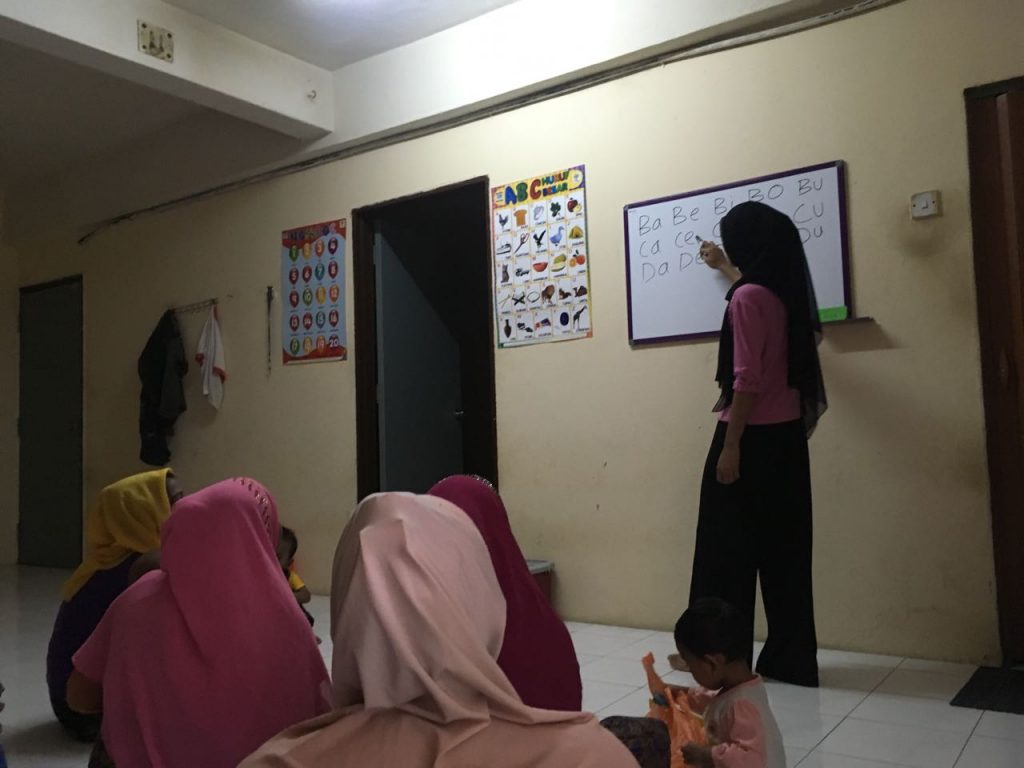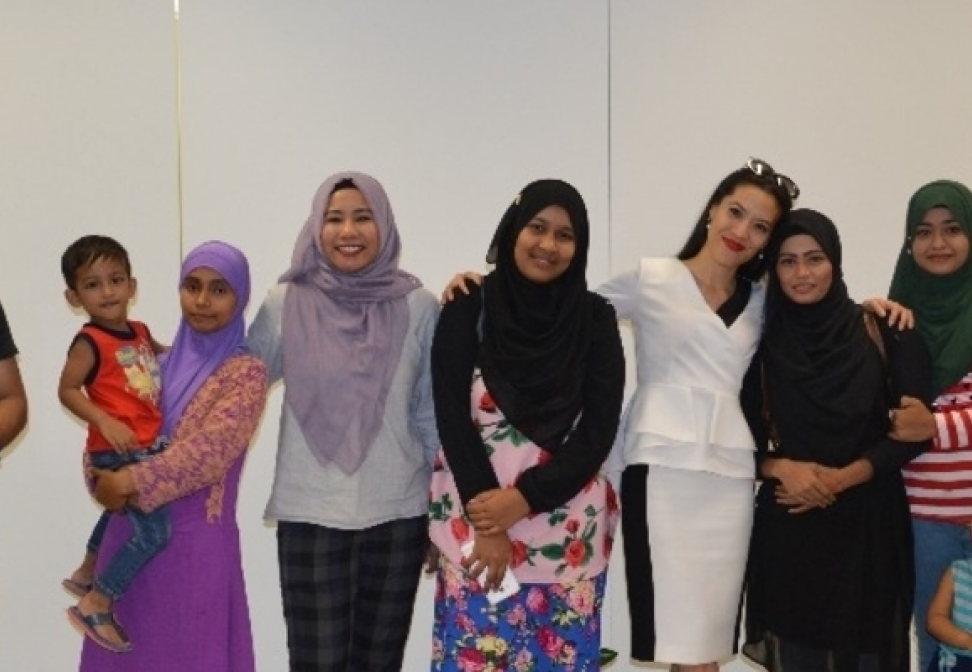Education for Refugees: Lessons from the Ground
There are no refugees in Singapore. But that didn’t stop Mathilda and Wani from joining the global movement to support refugees through Advocates for Refugees Singapore.
In a small rental flat in Malaysia, 12 Rohingya refugee women, young and old, sat in a circle. Hasson, a young Rohingya who works with a non-profit Geutanyoe Foundation, started asking them about their educational background.
None present could read or write; neither could they converse in the local Malay language or English.
Drawing on his experiences with many Rohingya men and women seeking refuge in Malaysia, Hasson underlined the need to be literate: to be able to sign against their names at clinics; to read utility bills, among other important reasons. The women around him nodded and chipped in their agreement.
What began as a needs-assessment session turned into a bi-weekly Malay or English language class taught by young, educated Rohingya refugee women. Every week, these women would arrive in a home volunteered by one of the students to reduce costs and safety concerns attached to travelling, as they learn how to write their ABCs.
Currently, Malaysia has an estimated number of 100,000 registered Rohingya refugees. Geutanyoe’s Homeschool programme started in December 2017 in response to the learning needs of Rohingya women who are considered one of the most vulnerable communities in Malaysia. The programme, which was funded for a year by the U.S. Embassy in Malaysia, was conceptualised and designed by refugees themselves to address their everyday needs.
Since 2019, the programme has extended its outreach to other communities, such as the Afghan refugee community, after receiving requests from the community’s women. Such instances challenge the perception of overly dependent refugees who have no desire for self-improvement nor the knowledge of what is best for them. Hasson’s efforts, together with other refugee teachers, demonstrate refugees’ role in designing their own education.
While there are examples of successful refugee-led organisations, many of these are often eclipsed by narratives of dependent and backward refugees. Consequently, there are burgeoning numbers of well-intended educational programmes to help refugees but do not consider refugees as a major stakeholder. There is little desire to understand their worlds and their challenges as refugees living in limbo whose futures are uncertain. How, then, should education for refugees look like?
Refugees as Major Stakeholders
“With the homeschool, I can read street signs and I know where to go." “I can now go to market on my own and buy groceries.” These are sentiments expressed by many women who attended the homeschool classes, proud that they were finally able to go about their daily activities on their own. Not being able to read, to converse in the local language – these were concerns that were surfaced to Hasson and the Rohingya teachers during the needs-assessment conducted before the start of the programme. As such, instead of using a standard syllabus for language classes, curriculums were designed with the everyday needs of these Rohingya women in mind, and classes were scheduled around their domestic activities. More importantly, since the program coordinator and teachers are from the Rohingya community themselves, they are attuned to the contexts and challenges of the community.
As Lilianne Fan, the Director of Geutanyoe Foundation often emphasised, the need to include refugees in designing their own programmes are important since they concern the lives of these refugees. The respect and sensitivity to the needs of these adult learners and their active involvement enable them to contribute in shaping the objectives and outcomes of the homeschool programme. Such collaboration also gives more agency and ownership to these women, making them more committed to learning. The homeschool programme reflects and reiterates the need for participatory methodology in programme design.
There is no one-size-fits-all solution, as different communities and age groups have different needs. HELP for Refugees, a refugee-led organisation in Indonesia, offers not only adult literacy classes, but also vocational classes to equip refugees with skills to prepare them for community integration. Being aware of the realities of the community they work with enables HELP to respond to the needs on the ground while also gaining support from the refugee community. Similar to Geutanyoe’s Homeschool programme, the endorsement from their own community allows them to continue to provide and sustain their activities.
Al-Ikhlas Hope Society in Malaysia provides basic education for Rohingya children. Assisted by an NGO, Ustaz Arfat, a Rohingya refugee, established the school to serve the needs of his community. Since Malaysia is not a signatory to the 1951 UN Refugee Convention, refugees have no right to education and are unable to attend national schools. Al-Ikhlas, like many community schools, address the gaps not provided by the government. In response to requests from the Rohingya community, the school also provides religious education for the children. In addition, children at Al-Ikhlas do not just study the national syllabus; they are also exposed to Burmese language.
“It’s a way of maintaining their ties to their homeland,” said Norliza Nordeen, Founder of Al-Ikhlas Hope Society.
 (Photo credit: Geutanyoe Foundation)
(Photo credit: Geutanyoe Foundation)Education for the Future
The growing number of partnerships with higher institutes of learning are opening pathways for young students to pursue higher level education. Although refugees are still constrained by the lack of legal or administrative refugee framework in Malaysia and Indonesia, these opportunities are still pertinent for their overall development, their pursuit of a better future - and for some, to reconstruct much needed normalcy for the present and future, especially due to the length of time a refugee spends in displacement.
Yet, with the ongoing pandemic, many education programmes have had to innovate. For instance, HELP and Geutanyoe have taken their adult literacy classes online - either through video calls or WhatsApp. Nonetheless, we are reminded that not everyone has the privilege to access online classes due to lack of resources e.g. wifi, electricity, technology. While this is an issue that affects other marginal communities, it also makes education for the already precarious refugees even more challenging. It becomes even more important to involve refugees in planning due to knowledge of their community’s contexts. There’s never been a better time to recognise the importance refugees play in moulding the future generations through shaping their education.
Support AFG-SG in their Refugee Awareness Week (RAW 2020) campaign:
Participate in their hashtag campaign #WhyBorder
Donate to their campaign for Cahaya Surya Bakti
Pre-order RAW 2020 Campaign Merchandise
(Thanks to Geutanyoe Foundation for all the photos featured in this blog post.)
About Advocates For Refugees - Singapore
Advocates For Refugees - SG (AFR-SG) is a ground-up, volunteer-led movement working for the cause of refugees and forced migration in our region and beyond since 2016. In 2019, AFR-SG supported School for Tomorrow, a learning centre that provided education for refugee and undocumented children.
As a partner of Geutanyoe Foundation, AFR-SG has rendered assistance for its livelihood and education programmes. Currently, AFR-SG is supporting Cahaya Surya Bakti, a Johor-based NGO, to raise funds for Rohingya refugee children to continue their education post-pandemic.
AFR-SG's areas of focus include awareness campaigns, advocacy and legal research and partnerships. AFR-SG is a Member Organisation of the Asia Pacific Refugee Rights Network (APRRN).






